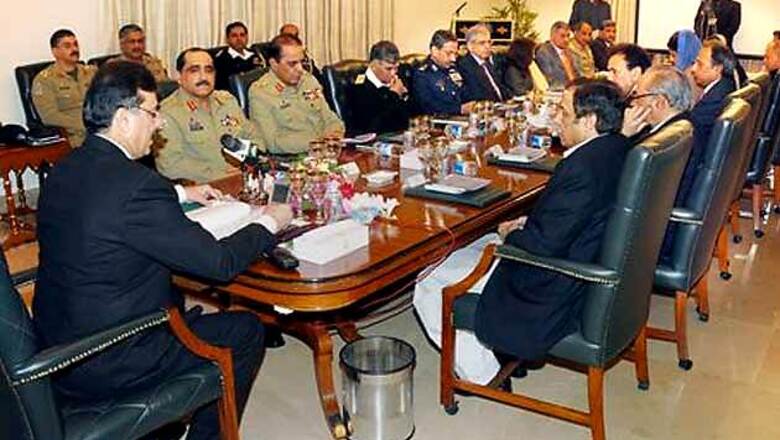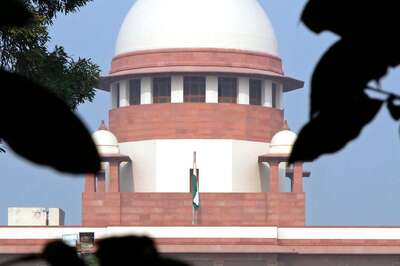
views
Islamabad: It's going to a hectic and important day in Pakistan as the Supreme Court hears the re-opening of corruption cases against President Asif Ali Zardari while Prime Minister Yousuf Raza Gilani could seek a vote of confidence in the National Assembly to save his embattled government.
Gilani is expected to win the vote on a resolution that seeks endorsement and support for "efforts made by the political leadership for strengthening democracy" and calls for reposing "full confidence and trust" in the leadership on Monday evening even as reports claim the powerful military led Army Chief General Ashfaq Parvez Kayani would rally behind the Supreme Court.
The Pakistani Prime Minister has been defiant and told Parliament that the country does not need another dictators but a strong democracy. He has also rejected the Army's demand that he retract his criticism of the military, saying "I will not answer to any individual as I am answerable to Parliament."
His remarks came in the backdrop of reports that the powerful General Kayani had told President Zardari to ask the Prime Minister clarify or retract his criticism of the Army and the ISI.
Meanwhile, a 17-member bench of the Supreme Court is hearing a petition on reopening of corruption cases that were closed under the National Reconciliation Ordinance (NRO), a corruption amnesty issued by former military ruler Pervez Musharraf in 2007.
Last week, the judges had called Gilani a dishonest man for not having implemented the SC's orders on the NRO.
Tensions between the government and the military reached a peak last week after Gilani said the army and intelligence chiefs had acted in an "unconstitutional and illegal" manner by filing affidavits on the memo issue in the Supreme Court without getting the government's approval.
The military rebuked Gilani, saying his remarks could have "grievous consequences". Gilani retaliated the same day by sacking Defence Secretary Lt Gen (retired) Khalid Naeem Lodhi, a confidant of Kayani, saying he had created misunderstandings over the memo issue.
This week the court can order one of the six options that include disqualifying Gilani from Parliament, and hauling him and President Zardari for contempt.
Waiting in the wings are players like Imran Khan and former President General Pervez Musharraf, who ironically had created the NRO and squabbled with the Supreme Court over its implementation.
Meanwhile, the judicial commission appointed by the Pakistani Supreme Court to investigate memogate has begun its hearing which could pave the way to unseat Gilani's Cabinet.
Pakistani American businessman Mansoor Ijaz has not shown up for his deposition before the commission and instead asked it to give him time till January 25 to testify in the scandal.
His counsel on Monday claimed that Ijaz has been getting threat calls and wanted to get insurance done for the safety of himself and his family.
The memogate commission asked Ijaz's lawyer Akram Sheikh to explain clearly whether Ijaz intends to come to Pakistan after he claimed that Ijaz has applied at the Pakistani Embassy at Berne in Switzerland on Monday to get a visa to travel to the country. Ijaz was scheduled to appear before the commission on Monday which began its third sitting in the morning.
He was expected to hold President Zardari responsible for the memo allegedly seeking US help to avert a coup in Pakistan after the raid that killed Taliban chief Osama bin Laden in the garrison town of Abbottabad on May 2, 2011.
The lawyer of Pakistan's former envoy to the US Husain Haqqani claimed that Ijaz was avoiding the commission and had no intention of coming to Pakistan. The lawyer added that Ijaz was setting all unnecessary conditions for his visit to appear before the judicial commission investigating memogate.
Haqqani was forced to resign after Ijaz made public the memo.
The memogate has pit the Pakistani government directly against the the powerful Army.
The apex court accepted Kayani's request for a probe into the memo scandal while rejecting the government's contention that the issue should be investigated by a parliamentary panel.
The Supreme Court has been building pressure on the government since it struck down the NRO, which benefited President Zardari and 8,000 others, in 2009.
It has pressured the government to write to Swiss authorities to reopen cases of alleged money laundering against Zardari but the government has refused to do so, saying the President enjoys immunity under the Constitution.
Zardari himself has said that the government will not approach the Swiss authorities as long as he is in office as such a move would be tantamount to putting on trial the grave of his wife, former premier Benazir Bhutto, who too had benefited from the NRO.
However, the Supreme Court warned last week that the remier could be disqualified and that action could also be taken against the President if the government kept defying its orders on the NRO issue.
Meanwhile, Canada-based Research In Motion (RIM), has refused to share all the data pertaining to memogate, citing privacy laws.
In the past one week, Pakistan's government has lurched from a standoff with the Army to one with the political opposition. Now, as it braces for a possibly harsh ruling from the Supreme Court, observers say it may choose to face the people instead, that is, calling for early elections.
(With additional information from PTI)




















Comments
0 comment